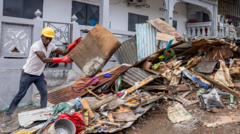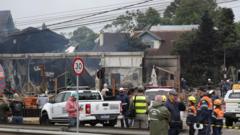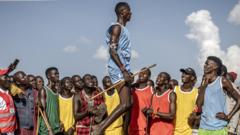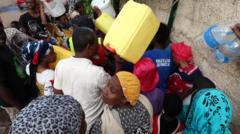Cyclone Chido, which struck Mozambique on December 15, has resulted in 94 fatalities, with hundreds injured and over 622,000 individuals impacted. The cyclone's consequences extend beyond immediate loss of life, affecting education and healthcare systems in the region.
Devastation in Mozambique: Cyclone Chido Claims 94 Lives and Affects Thousands
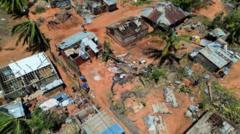
Devastation in Mozambique: Cyclone Chido Claims 94 Lives and Affects Thousands
The toll rises in Mozambique as Cyclone Chido wreaks havoc, prompting urgent government and international response.
Cyclone Chido has left a devastating mark on Mozambique, claiming the lives of 94 individuals since its landfall last week, according to local authorities from the National Institute of Risk and Disaster Management (INGD). The cyclone, which made landfall on December 15 with wind speeds reaching 260 km/h (160 mph) and dumping 250mm of rain within the first 24 hours, injured a staggering 768 people and displaced over 622,000 across the affected regions.
The cyclone's initial impact was seen in the French Indian Ocean territory of Mayotte, where it brought about the worst storm in nearly a century, claiming at least 35 lives and leaving many residents in dire need. Efforts to assess the extent of the disaster continue, with officials warning that the death toll may rise significantly as recovery operations progress. Access to basic necessities, such as food and clean water, remains a challenge for many in Mayotte.
As Chido moved onward from Mayotte into Mozambique, it struck the typically cyclone-prone northern provinces of Cabo Delgado, Niassa, and Nampula, where infrastructure has been severely affected. Over 109,793 students have been adversely impacted due to school closures and structural damage. Health services face crucial threats, with 52 sanitary units reported damaged, limiting access to essential medical care in areas that were already at risk before the cyclone.
Mozambique's ruling party leader, Daniel Chapo, announced in local media that the government is mobilizing resources at all levels to support recovery efforts. Highlighting ongoing initiatives in Cabo Delgado, Chapo revealed partnerships with the INGD to assist affected provinces such as Mecúfi, Nampula, Memba, and Niassa in their rebuilding efforts.
The impact of climate change on storms like Cyclone Chido is under scrutiny, with the Intergovernmental Panel on Climate Change (IPCC) noting the significant role humans play in increasing precipitation associated with such weather events. While assessing the precise influence of climate change on individual cyclones remains a complex task, the rising temperatures are seen as a contributing factor to the intensity of storms.
This disaster underscores the vulnerability of social infrastructure to climate-related impacts and emphasizes the urgent necessity for resilient planning strategies to mitigate future risks. As governments and organizations assess damages and rebuild, the need for improved preparedness to address the consequences of increasingly extreme weather events becomes exceedingly clear.
The cyclone's initial impact was seen in the French Indian Ocean territory of Mayotte, where it brought about the worst storm in nearly a century, claiming at least 35 lives and leaving many residents in dire need. Efforts to assess the extent of the disaster continue, with officials warning that the death toll may rise significantly as recovery operations progress. Access to basic necessities, such as food and clean water, remains a challenge for many in Mayotte.
As Chido moved onward from Mayotte into Mozambique, it struck the typically cyclone-prone northern provinces of Cabo Delgado, Niassa, and Nampula, where infrastructure has been severely affected. Over 109,793 students have been adversely impacted due to school closures and structural damage. Health services face crucial threats, with 52 sanitary units reported damaged, limiting access to essential medical care in areas that were already at risk before the cyclone.
Mozambique's ruling party leader, Daniel Chapo, announced in local media that the government is mobilizing resources at all levels to support recovery efforts. Highlighting ongoing initiatives in Cabo Delgado, Chapo revealed partnerships with the INGD to assist affected provinces such as Mecúfi, Nampula, Memba, and Niassa in their rebuilding efforts.
The impact of climate change on storms like Cyclone Chido is under scrutiny, with the Intergovernmental Panel on Climate Change (IPCC) noting the significant role humans play in increasing precipitation associated with such weather events. While assessing the precise influence of climate change on individual cyclones remains a complex task, the rising temperatures are seen as a contributing factor to the intensity of storms.
This disaster underscores the vulnerability of social infrastructure to climate-related impacts and emphasizes the urgent necessity for resilient planning strategies to mitigate future risks. As governments and organizations assess damages and rebuild, the need for improved preparedness to address the consequences of increasingly extreme weather events becomes exceedingly clear.

